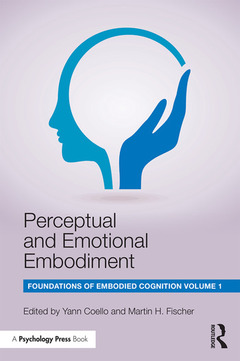Description
Perceptual and Emotional Embodiment
Foundations of Embodied Cognition Volume 1
Coordinators: Coello Yann, Fischer Martin H.
Language: English
Subject for Perceptual and Emotional Embodiment:
Keywords
Embodied Cognition; Body Structural Description; Embodied Cognition; Embodied Perception; Embodied Emotion; Neural Basis of Embodiment; Philosophy of Mind; De Vignemont; Body Schema; Peripersonal Space; Rubber Hand; Bodily Affordances; Body Integrity Identity Disorder; Reaching Space; Proprioceptive Drift; Facial Mimicry; Extended Mind Thesis; Extended Mind; Postural Affordances; Heartbeat Perception; Body Dysmorphic Disorder; Ventromedial Prefrontal Cortex; IA; Mirror Neuron; Vice Versa; Radical Embodiment; Heartbeat Perception Task; Embodied Cognition Approaches; Modular Input Systems; Moderate Embodiment
Publication date: 12-2015
· 15.6x23.4 cm · Paperback
Publication date: 12-2015
290 p. · 15.6x23.4 cm · Hardback
Description
/li>Contents
/li>Readership
/li>Biography
/li>
This two-volume set provides a comprehensive overview of the multidisciplinary field of Embodied Cognition. With contributions from internationally acknowledged researchers from a variety of fields, Foundations of Embodied Cognition reveals how intelligent behaviour emerges from the interplay between brain, body and environment.
Covering early research and emerging trends in embodied cognition, Volume 1 Perceptual and Emotional Embodiment is divided into four distinct parts, bringing together a number of influential perspectives and new ideas. Part one opens the volume with an overview of theoretical perspectives and the neural basis of embodiment, before part two considers body representation and its links with action. Part three examines how actions constrain perception of the environment, and part four explores how emotions can be shaped and structured by the body and its activity.
Building on the idea that knowledge acquisition, retention and retrieval are intimately interconnected with sensory and motor processes, Foundations of Embodied Cognition is a landmark publication in the field. It will be of great interest to researchers and advanced students from across the cognitive sciences, including those specialising in psychology, neuroscience, intelligent systems and robotics, philosophy, linguistics and anthropology.
Introduction Yann Coello & Martin FischerPart I. Theoretical accounts & neural basis of embodiment 1. Situated conceptualization: Theoretical properties and applications Lawrence W. Barsalou 2. Assessing radical embodiment Pierre Jacob 3. The animal-environment system Luis H. Favela, Tony Chemero 4. Embodied cognition according to TEC (Theory of Event Coding) Bernhard Hommel 5. Grounding and embodiment of concepts and meaning: a neurobiological perspective Rachel Moseley, Markus Kiefer, Friedemann PulvermüllerPart II. The body represented 6. Types of Body Representation Matthew R. Longo 7. The body schema as a condition of possibility for action Hong Yu Wong 8. Bodily affordances and bodily experiences Frédérique De VignemontPart III. Embodied perception 9. How actions constrain the visual perception of space Nicolas Morgado, Richard Palluel-Germain 10. How the body narrows the interaction with the environment Marcello Costantini, Mog Stapleton 11. Embodied perception of objects and people in space: Towards a unified theoretical framework Yann Coello, Tina IachiniPart IV. Embodied emotion 12. Embodied emotion: The functional mystery of embodying emotions Martial Mermillod, Johan Lepage 13. Embodying emotions: The role of body modifications in emotional processing in normal populations and psychopathology Anne Kever, Delphine Grynberg, Marie Bayot, Nicolas Vermeulen 14. The role of the body from the inside for embodied cognition Olga Pollatos
Yann Coello is Professor of Cognitive Psychology and Neuropsychology, University of Lille, France.
Martin H. Fischer is Professor of Cognitive Sciences, University of Potsdam, Germany.



